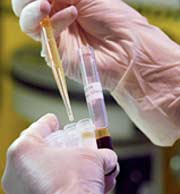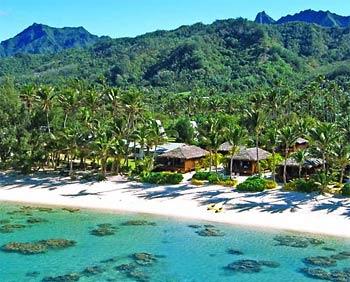ISSUE 45: MARCH-MAY 2007
network of research and training centres/programmes
FRONT PAGE | ARCHIVE |
Gene hunters leave trail of bitterness in South Pacific
The Pacific region has experienced some of the world's worst examples of unethical bio-research and patenting of genes by international companies, according to a new book launched by co-publishers Call of the Earth Llamado de la Tierra and United Nations University (UNU).
The unique flora, fauna and peoples of the small island nations scattered across the South Pacific have attracted hordes of genetic and biomedical researchers who have patented DNA without permission. Bizarre human-animal hybrid transgenic experiments have been conducted and one biomedical experiment nearly turned the tiny Cook Islands into a "rogue state" in the eyes of the US government, according to the book.
 |
"Researchers are harvesting and patenting the Pacific region's genetic resources by simply gathering and taking ownership over almost everything in their path," says Aroha Mead, Senior Lecturer at Victoria University, Wellington, New Zealand, and co-editor of the book, Pacific Genes and Life Patents.
An absence of regulation and widespread naiveté regarding the latest genetic technologies and intellectual patent law has made the region a major target for commercial 'gene' hunters or bio-prospectors, she says, likening gene pirates to the oceans’ bottom feeders.
"In South Pacific cultures a plant is a living ancestor – and even a drop of human blood retains its life spirit after it has been collected for medical research or synthesized and specific DNA qualities isolated," says A.H. Zakri, director of UNU Institute of Advanced Studies (UNU-IAS). “The authors chronicle many actions over the years by the scientific and private sector communities that offend these deeply-held values. We hope this book helps advance international understanding.”
According to contributor Te Tika Mataiapo - Dorice Reid, a traditional Chief from the Cook Islands: "Genes are a key resource of the new world bio-economy and our isolation and diversity makes the Pacific Islands particularly attractive." The modern bio-economy crashes head on with traditional cultural and spiritual values in the South Pacific, she adds.
 |
| The Cook Islands: threatened with 'rogue nation' status over xenotransplantation experiments using pig cells. |
"Plants and animals are not seen as mere physical or biological entities but also as embodiment of ancestral spirits," says co-editor Steven Ratuva of Fiji, a senior fellow at the University of the South Pacific.
The book documents the episode in which the Cook Islands nearly became the site for the world's first transplantation of pig cells into living humans (xenotransplantation) as a cure for diabetes in 2002. Pacific Islanders in general suffer from very high rates of Type-2 diabetes, and some researchers claimed transplanting pancreas cells from pigs into diabetics offered a potential cure. The New Zealand government had banned such xenotransplants as too risky in 2001.
Had the experiments gone forward, the US might have branded the Cook Islands and its 14,000 inhabitants a "rogue nation," writes Cook Islands’ Traditional Chief Te Tika Mataiapo - Dorice Reid. Panicked US government health officials threatened to bar admission into the US of anyone from the islands as potential carriers of dangerous retroviruses from the pig cells.
After initially agreeing to the xenotransplants in 2002, the Cook Islands’ government reversed its decision after protests from tribal leaders like Reid and the world medical community.
The Cook Islands and Pacific Island states generally have great difficultly staying abreast of developments in biotechnology and developing legislation to cope with social, legal, and ethical implications of the new technologies, says Reid.
The proposed pig cell transplantation episode illustrates that "some companies are willing to take advantage of this lack of capacity and absence of regulation," she says.
![]() MEDIA
COVERAGE SUMMARY (requires Google registration)
MEDIA
COVERAGE SUMMARY (requires Google registration)
© 2007 United Nations University